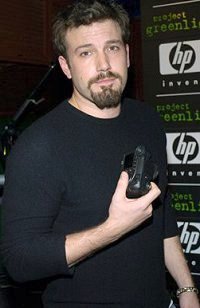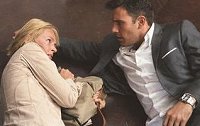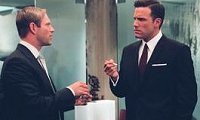 Nothing Personal
Nothing Personal
 On originally trying to get Matt Damon to star in the film...
On originally trying to get Matt Damon to star in the film...Woo: Unfortunately heíd already done an amnesia movie and he didnít want to repeat the same role. But he was a big fan of Ben Affleck, and he said Ben would be better than him. Actually, itís true. I love Ben and all his films, especially Good Will Hunting and Changing Lanes. I find that Ben has great charisma ó he also reminds me of a young Cary Grant. I had a great time with Ben; heís a real person, you know? I thought he was really right for the role, and at the same time, heís so humble, always happy to work with anybody. And heíd never say ĎNoí, you know?
Affleck: Just for you, John. Other directors I give a harder time to. And yes, Matt and I get offered the same roles all the time. One of the nice things when you have a friend whoís a contemporary in the same business is that itís somebody to bounce ideas off whose tastes you share. Matt and I were both great fans of Johnís for a long time; he said the script was really good and he had met with John and I should talk to him. So itís nice to have somebody that you respect, who you knew from before who is in a similar position to you. I guess most actors at a certain level donít know each other, or if they do itís not to the extent where theyíll call each other up and suggest this or that. Matt and I are in are in a nice position that way. I suppose I should give him a little kickback.
On reading out some bad reviews for Gigli for David Letterman...
Affleck: I actually donít read my reviews, but on that Letterman show I had seen a collection of the various reviews on email, some that were particularly excoriating. My publicist put together a list of excerpts, spared me having to pore over them all, and just had some greatest hits lines from them. In general I donít read my reviews, because for one thing I find that film critics these days are telling people whether or not to go and see a movie, and are not really approaching film criticism from the viewpoint of what would be helpful to you as an artist. That would be like, what were you were trying to do and did you accomplish it? Sometimes itís just about being clever, and thatís okay but itís not particularly helpful in the sense that itís not really about what youíre doing. So in the same way that I avoid reading press clippings I avoid reading reviews because itís distracting. You never want to be there making a movie and at the back of your head anticipating what people would say about it. That can be really distracting.
On the real Ben versus the guy we read about in the press...
Affleck: They bear little resemblance to one another, itís true. I think thatís a natural thing that happens. You can become a sort of projected image in a way, whether itís ĎThe Iconic Great John Wooí ó excuse me, John ó or some image of an actor who develops some point of view or another. Inevitably itís a kind of reductive simplification of who you are, and often about other peopleís ideas and their projections, what theyíre thinking about and theyíre responding to. Thereís not much point in spending a lot of time going over it.
On getting used to fame...
Affleck: The accelerated pace of success is something to adjust to, certainly, but itís probably a lot easier to adjust to than the accelerated pace of failure! Itís important for someone in my position to focus on how grateful I am, that Iím very fortunate and really very blessed, rather than dwell on what particular difficulties it brings with it. But the short answer is: Iím extremely pleased, very lucky and just happy to be given the opportunities that I have. Mostly I focus on looking forward, continuing to try to improve and make myself a better person and a better actor. But itís pretty good.
On writing versus acting...
Affleck: Writing gives you more of a sense of authorship, and that is interesting, but lately what Iíve been drawn to is working with directors from whom I can learn a lot. Thatís an aspect you donít get from writing, finding somebody you admire, who you think is really talented, and dedicating yourself to apprenticing from them. Thatís the real gift of being an actor. Directors like John might spend a year and a half to do a movie, where I can do three movies in that time and work with several different directors and see how they work and think. And when itís somebody like John, every day is an education and is valuable to me.
On working with Uma Thurman...
Affleck: Well, Umaís obviously quite beautiful and she also has an ease about her ó maybe because sheís been successful for some time now, thereís not an insecurity mixed with a desperation that is sometimes in the character of actors who are made a little nuts by the business. Sheís extremely well-educated, refined and yet accessible. Thatís quite a rare combination. Sheís also quite talented and sheís also a really great mother. She has these two sweet little kids in tow, and you felt like they were smarter than you so you didnít want to talk with them for long for fear of being embarrassed.
Woo: Sheís a real actress, you know ó hard-working, professional, she would never like to talk to anyone, just stay in the corner, trying to build up her emotion. And when I wanted to explain the camera angle, sheíd never care whether the camera could see her face or not. Also, sometimes, if her hair was messy and I wanted to change it, sheíd always push away my hand, she never cared. Some actors are really conscious about the cameras, they want their faces to be seen, they want to look beautiful, but she just doesnít care. And she came up with some good ideas, some good dialogue, and she wanted to do her stunts by herself, didnít want a stunt double. I think Uma and Ben worked together well ó they had great chemistry, theyíre both very charming people. And they really made the love story more romantic and funny. The only problem working with Ben and Uma was that I had to look up to them all the time, after a while my neck hurt because theyíre both so tall!
THE DORCHESTER, LONDON, 12.JAN.04



